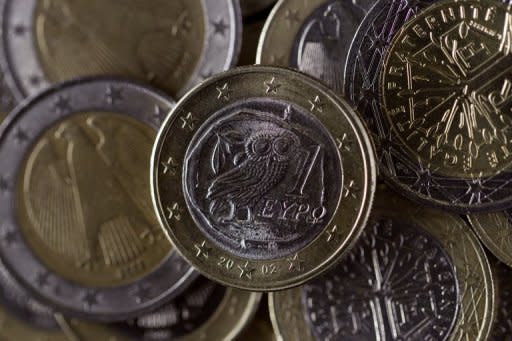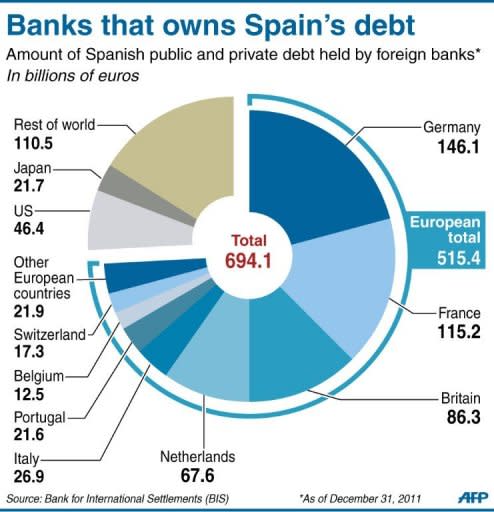Spain borrowing costs smash record after downgrade
Spain's borrowing costs leapt to a euro-era record Thursday after Moody's downgraded its debt close to junk-bond status and warned of a rising risk of a full-blown bailout. A weekend deal for eurozone powers to extend a bailout loan of up to 100 billion euros ($125 billion) to salvage Spain's stricken banks failed to stop an intensifying storm on the debt market. Instead, the size of the rescue loan fed fears about its impact on Spain's mushrooming sovereign debt and prompted concerns that the state may eventually need rescuing itself. The Spanish crisis is unfolding against the background of Sunday's Greek elections, further destabilising markets that fear a victory by anti-austerity parties could send Athens back to the drachma. "We are living in a period of volatility, a tense situation," Economy Minister Luis de Guindos told reporters after meeting with Prime Minister Mariano Rajoy and other top policymakers. "This week is a difficult week before the Greek elections and obviously the government is aware of the situation," the economy chief said. "But in these circumstances the government wants to send a message of calm, a message that we know absolutely that we have the support of all our partners," he said. The interest rate on Spanish 10-year government bonds soared to 6.9650 percent, the highest since the birth of the single currency in 1999, from 6.721 percent the previous evening. The risk premium -- the difference in the rate between Spanish and safe-haven German 10-year bonds -- breached 5.50 percentage points, another euro-era record. De Guindos said the risk premium was not sustainable over time and he was convinced the government's policies would bring it down "in the next days and weeks". "The key thing is calm," he added. "The government is on top of things, it is on top of matters, it is taking measures and it will continue to take measures and it will do so not only depending on the risk premium and what's happening today but also depending on the interests of Spain and the eurozone." Such high interest rates are regarded by many analysts as impossible for the nation to afford to finance its activities over the longer term, raising the risk of a bigger bailout, just as was the case for Greece, Ireland and neighbour Portugal. Moody Investors Service slashed Spain's sovereign debt rating by three notches late Wednesday to Baa3 and left it on review for a possible further downgrade. banks The eurozone loan is aimed at recapitalising banks whose books are heavily exposed to a 2008 property market crash, but the final responsibility for repaying it is clearly Spain's, Moody's said. "This will further increase the country's debt burden, which has risen dramatically since the onset of the financial crisis," the agency said in a statement. It predicted Spain's public debt, which amounted to 68.5 percent of economic output at the end of 2011, would bulge to 90 percent this year and carry on rising until the middle of the decade. At such high borrowing rates Madrid had limited access to the markets, the agency said. Further, the country was increasingly dependent on commercial banks, flush with cheap loans provided the European Central Bank, to buy its government bonds, the agency said. "In Moody's view this is an unsustainable situation." Unless there were signs of a quick improvement in Spain, such as an exit from recession or rapid progress in cutting the deficit, "neither of which is likely," the agency warned that Spain would be increasingly constrained in refinancing maturing debt. If unchecked, Moody's said Spain could lose affordable access to the debt markets and face a rising risk of a full-blown state bailout by the European Financial Stability Facility and/or the new European Stability Mechanism, which comes into force next month. "Moody's action to place the government's rating one notch above speculative grade reflects the rating agency's view that Spain has moved much closer to needing to seek direct support from the EFSF/ESM, and therefore much closer to being positioned within speculative grade," it said. If the Spanish state requires a rescue private investors could be burned, as they were in Greece, the agency said. In Washington, the International Monetary Fund reiterated that it had no plans to provide financial aid to Spain. "It's also important at the same time, of course, that the reform programme that the Spanish government has undertaken continues to be implemented as they are doing," said IMF spokesman Gerry Rice.




